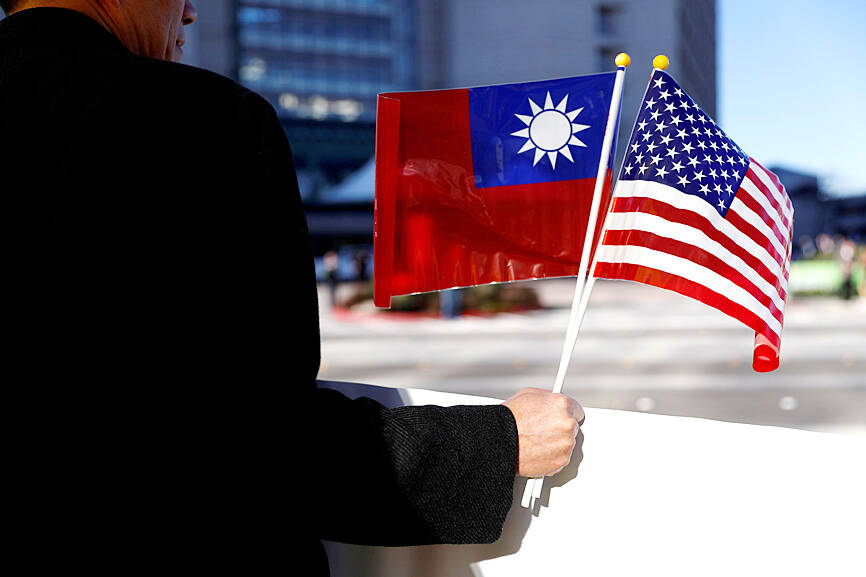The US agency tasked with driving scientific research has launched a program to connect US start-ups with their Taiwanese peers, backing Taiwan’s ambitions to foster key players in strategic sectors such as semiconductors, artificial intelligence (AI) and beyond.
The National Science Foundation (NSF) — one of the US federal government’s biggest outfits for funding research — is for the first time sponsoring a series of workshops abroad to help US start-ups work with their overseas counterparts. It chose to begin in Taiwan, which plays an increasingly pivotal role in chips and the technology supply chain.
The Ministry of Economic Affairs is backing the effort, which aims to discover and finance firms exploring “deep tech,” or cutting-edge arenas, including biotechnology and quantum computing.

Photo: Reuters
The US agency intends to expand the program to other nations over time, NSF Director Sethuraman Panchanathan told Bloomberg News.
While many of history’s most successful start-ups — including the likes of Nvidia Corp — began in the US, the bulk of hardware innovation now centers on Asia.
Taiwan Semiconductor Manufacturing Co (TSMC, 台積電) alone makes about 90 percent of the most advanced logic chips.
The US Department of Commerce has awarded TSMC US$11.6 billion of grants and loans to build three plants in Arizona, underscoring its pivotal industry role.
“You just can’t do everything on your own or within the United States. You have supply chains and other things that are global,” said Michelle Kiang (江夢熊), the cofounder of Impact Science Ventures who helped the US agency conceive the program.
She devised the program with David Horsley, a Northeastern University professor and chip researcher.
“So you want to invest in those relationships early and also in different ways, so that these start-ups out of the United States are able to build a very strong global supply chain as well as a global business to continue to fuel the growth of the US economy,” Kiang said.
Taiwan’s technology start-ups have struggled to raise funds the way their counterparts in Silicon Valley do. The government is looking to change that, National Science and Technology Council Minister Wu Tsung-Tsong (吳政忠) said.
One of his missions is to help bridge the gap between academia and industry, not unlike the US foundation. The council is also keen on attracting more overseas talent, such as through a contest for global technology start-ups to be announced next month that would offer the winners a chance to turn their ideas into reality with Taiwanese companies, including TSMC.
Last year, the government launched the Taiwan Chip-based Industrial Innovation Program with a US$10 billion budget over 10 years.
“For Taiwan, manufacturing plays a very important role, but for innovations in different areas, we are still on the starting step,” Wu told Bloomberg News. “We think that if a lot of talent comes to Taiwan, then capital will come.”

CRITICAL MOVE: TSMC’s plan to invest another US$100 billion in US chipmaking would boost Taiwan’s competitive edge in the global market, the premier said The government would ensure that the most advanced chipmaking technology stays in Taiwan while assisting Taiwan Semiconductor Manufacturing Co (TSMC, 台積電) in investing overseas, the Presidential Office said yesterday. The statement follows a joint announcement by the world’s largest contract chipmaker and US President Donald Trump on Monday that TSMC would invest an additional US$100 billion over the next four years to expand its semiconductor manufacturing operations in the US, which would include construction of three new chip fabrication plants, two advanced packaging facilities, and a research and development center. The government knew about the deal in advance and would assist, Presidential

‘DANGEROUS GAME’: Legislative Yuan budget cuts have already become a point of discussion for Democrats and Republicans in Washington, Elbridge Colby said Taiwan’s fall to China “would be a disaster for American interests” and Taipei must raise defense spending to deter Beijing, US President Donald Trump’s pick to lead Pentagon policy, Elbridge Colby, said on Tuesday during his US Senate confirmation hearing. The nominee for US undersecretary of defense for policy told the Armed Services Committee that Washington needs to motivate Taiwan to avoid a conflict with China and that he is “profoundly disturbed” about its perceived reluctance to raise defense spending closer to 10 percent of GDP. Colby, a China hawk who also served in the Pentagon in Trump’s first team,

SEPARATE: The MAC rebutted Beijing’s claim that Taiwan is China’s province, asserting that UN Resolution 2758 neither mentions Taiwan nor grants the PRC authority over it The “status quo” of democratic Taiwan and autocratic China not belonging to each other has long been recognized by the international community, the Mainland Affairs Council (MAC) said yesterday in its rebuttal of Beijing’s claim that Taiwan can only be represented in the UN as “Taiwan, Province of China.” Chinese Minister of Foreign Affairs Wang Yi (王毅) yesterday at a news conference of the third session at the 14th National People’s Congress said that Taiwan can only be referred to as “Taiwan, Province of China” at the UN. Taiwan is an inseparable part of Chinese territory, which is not only history but

INVESTMENT WATCH: The US activity would not affect the firm’s investment in Taiwan, where 11 production lines would likely be completed this year, C.C. Wei said Investments by Taiwan Semiconductor Manufacturing Co (TSMC, 台積電) in the US should not be a cause for concern, but rather seen as the moment that the company and Taiwan stepped into the global spotlight, President William Lai (賴清德) told a news conference at the Presidential Office in Taipei yesterday alongside TSMC chairman and chief executive officer C.C. Wei (魏哲家). Wei and US President Donald Trump in Washington on Monday announced plans to invest US$100 billion in the US to build three advanced foundries, two packaging plants, and a research and development center, after Trump threatened to slap tariffs on chips made